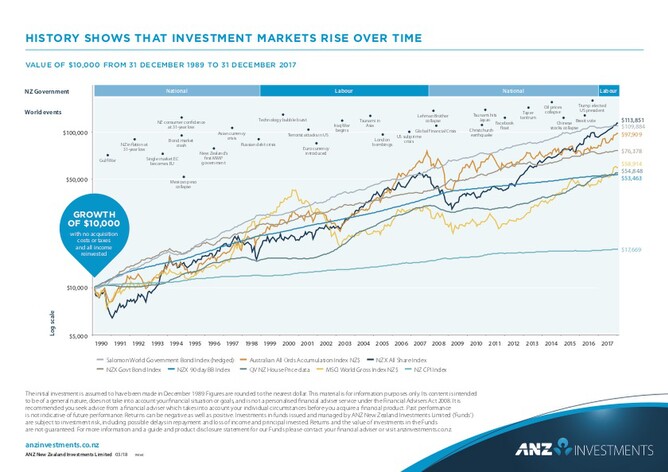For the last six weeks, we have seen headlines in the business pages about the share markets around the world going down, then going up the next day, followed by a fall the following day.
This is normal - the reason that the media is following these movements at the moment, is because of the size of the movements.
Like the natural world, markets follow cycles.
For the last two years, along with most of your fund managers we have been anticipating a correction in the investment markets. It feels well overdue, and the long run of positive returns seems to have been exacerbated by the excitement of large corporate tax cuts in the USA following the election of Donald Trump as President.
However, because things are cyclical, we need adjustments from time to time. The table below is an excellent reference graph to see how even with major events, the markets continue to grow as the value of companies grow over time. History_Shows_2018_A4_Final. Because most of your fund managers have been expecting this correction for some time, they have been holding more cash than normal (some between 15% and 20% of the portfolio), waiting for share valuations to adjust. This is a buying opportunity for them, but also for you if you are in a position to buy investments.
If you are a regular investor, then ups and downs like we have at the moment is great for your long term investment portfolio.
However, if you are in the situation where you are living off your investments, then the volatility is something that is to be expected, and over time will even out.
We might see very limited, or nil returns from markets for a 18 month to 30 month time period, or it might only be 12 months or it could be longer. We don't know.
The key is to understand that as the worlds economies and companies continue to innovate and grow, your investments in markets will continue to grow.
For people who are starting to invest, we will 'dollar cost average' your investments into the markets (putting in a small amount each month) over a defined time period, to even out the volatility.
When you change your investment strategy as you start living off your investments, we adjust your portfolio to make it less aggressive, adding more cash and fixed interest investments.
Long Term vs Short Term investments
If you are at the stage of your life where you are living off your investments, and drawing down your portfolio, the key is making sure that you have the following investments:
- An Emergency Cash fund (that gets topped up whenever you use it)
- At least one year (and ideally two years) of investments in 'cash' or short term term deposits for your day to day living costs
- Your longer term investments in a well diversified investment portfolio that represents your risk profile and stage of life.
If you have any questions or would like to discuss your investment strategy with your adviser, email your adviser directly at Carey, Peter, Paul, or contact us on contact@moneyworks.co.nz.


